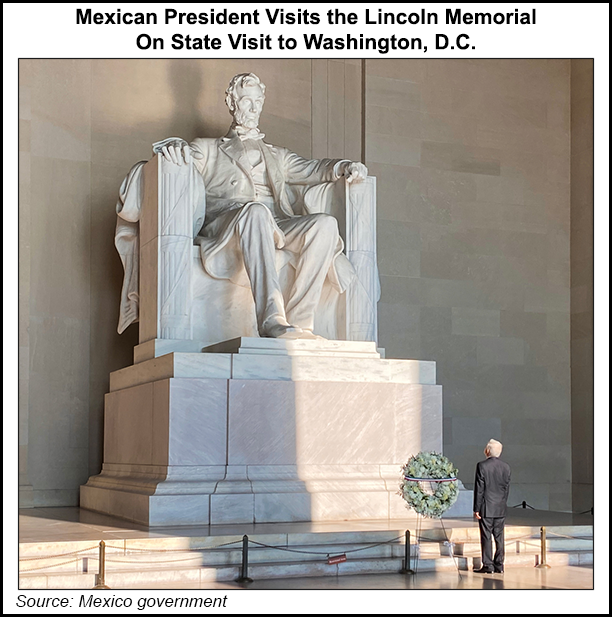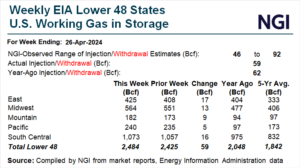Regulatory | NGI All News Access | NGI The Weekly Gas Market Report
AMLO, Trump Signal Value of Bilateral Relationship in Historic Meeting at White House

The presidents of Mexico and the United States signed a joint declaration on Wednesday celebrating the visit of Mexico President Andrés Manuel López Obrador to the White House and underlining the key relationship between the two nations.
“There were those who thought our ideological difference would take us to confrontation,” López Obrador said in the Rose Garden shortly before the ceremonial signing of the joint declaration. “Fortunately, this bad omen did not occur and looking to the future, I see nothing to harm our good relationship.”
The visit is the first trip abroad for the Mexican president, who goes by the nickname of AMLO, since taking office in December 2018. It also comes during the coronavirus pandemic that is thrashing both nations from a public health and economic standpoint.
On its surface, the Mexican leader’s trip abroad is to cement the signing into effect last week of the United States-Mexico-Canada Agreement (USMCA), an agreement that in Mexico has been touted as a means to kickstart the nation’s ailing economy.
“My visit is due to the importance of the coming into effect of the trade agreement between Mexico, the United States and Canada,” López Obrador said, while thanking Trump and the American people for treating Mexico with “kindness and respect.”
Trump, who has been adamant about building a wall across the entire border of the two countries, said that the 36 million Mexican Americans in the United States “uplift our communities and strengthen our churches and enrichen every feature of national life.”
He added that “working alongside President López Obrador, we’re taking this relationship to new heights and building a powerful economic and security partnership.”
Trump told López Obrador that he was “truly moved that you chose to make your first foreign visit since taking office … to be with us at the White House.”
The USMCA is worth $1.2 trillion in annual trade and is the basis for 12 million jobs across the three countries. But with Canadian President Justin Trudeau not present on Wednesday, the meeting put a spotlight on the crucial Mexico-United States bilateral relationship.
“This visit, in spite of its polemics and the debate around it, reflects an admission of shared interests,” said former ambassador of Mexico to the United States Gerónimo Gutiérrez in a webinar on the event organized by the Wilson Center. “Given the kickoff of USMCA, it’s important. Both countries need it right now.”
The energy implications of the relationship between Mexico and the United States are vast, with U.S. producers currently sending about 5.5 Bcf/d of natural gas south to Mexico, by far its biggest gas export market.
It was also energy that most recently brought the two heads of states – who are often depicted by political analysts as sharing similar styles of leadership – in contact.
Last week, López Obrador told journalists that part of the reason for this trip was to thank the U.S. president for help during the Organization of the Petroleum Exporting Countries and its allies, aka OPEC-plus, negotiations.
During the tense oil talks in early April, Mexico delayed the deal when it refused to commit to a requested 400,000 b/d in production cuts. Trump said that he would assist Mexico by offering an additional 250,000 b/d in U.S. cuts and in the end, Mexico said it would slash May and June production by 100,000 b/d.
But energy investors and private companies operating in Mexico have been hurt by policies under the López Obrador government that favor state firms and cloud regulatory certainty, and many hoped that this would be made clear during the state visit.
“The AMLO administration has not made foreign investors feel certain about their investments,” said Roberta Jacobson, a former U.S. Ambassador to Mexico, at the same webinar. “If that doesn’t change, USMCA will not be sufficient” to help the Mexican economy.
In a sign of the business climate overriding the visit, later Wednesday night, some of Mexico’s most prominent business tycoons, including natural gas infrastructure investor Carlos Slim, were set to join the two presidents for dinner.
“There are a lot of opportunities in USMCA and in global supply chains, but Mexico has to take the opportunity and attract investment,” said Earl Anthony Wayne, another former U.S. Ambassador to Mexico, during the webinar, adding that there “is no bilateral relationship in the world that touches the lives of more people.”
© 2024 Natural Gas Intelligence. All rights reserved.
ISSN © 2577-9877 | ISSN © 2577-9966 | ISSN © 1532-1266 |


